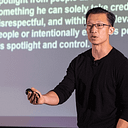Discover Positivity Through The Protests
Discover the hypocrisy in us.
Definition of hypocrisy: 1. the false profession of desirable or publicly approved qualities, beliefs, or feelings, esp. a pretense of having virtues, moral principles, or religious beliefs that one does not really possess.
I was watching this video and it got me thinking about hypocrisy. In it, Keeanga-Yamahtta Taylor, a Princeton University professor and author, makes an accusation towards Governor Cuomo that he may be expressing sympathy towards the black community, but his actions are wholly inadequate. Specifically, he has the power to change the system, but doesn’t.
This made me think about the hypocrisy within each of us. I don’t think anyone of us is so perfect that we are living 100% of our values. We make mistakes, errors, bad judgements, but we can forgive ourselves and need to be kind to ourselves. But what about in this moment? I’d venture to say a lot of people are grappling with their self-reflection and feeling the opposite of positive about themselves. I think natural responses are defensiveness, justifying/excusing past behavior, or even doubling down.
How do we use this moment to not dig deeper in the wrong way, but instead start getting our actions to match what we know is right?
For me, as I’ve gotten older, is listening and trusting my gut-feelings more. It’s taken me 40 years to calibrate my gut to my belief system. I’ve been finding it more right than wrong lately, such that when I sense something off, I know to pause and give it some thought. And then, of course, the magic happens when you actually take action because of it.
The Social Contract
YouTube Video — Trevor shares his thoughts on the killing of George Floyd, the protests in Minneapolis, the dominos of racial injustice and police brutality, and how the contract between society and black Americans has been broken time and time again.
Couple weeks ago when protests broke out across the United States, I was annoyed at how folks kept talking about the looting and riots (and still do), instead of the murdering of a black man. I interpreted this as defensiveness (best case) or racism (worst case). In this video, Trevor Noah does a great job of explaining this situation, and in describing the concept of a ‘social contract.’
Like Trevor said, we sign a social contract everyday with every single person we interact with. Forget laws and rules and all that; it comes down to the silent agreement we all make with each other, every single moment to be civil and treat each other fairly. Imagine being in a relationship where you get treated unfairly. Chances are you’d want to leave. But it’s your own house and you shouldn’t have to leave!
With empathy to the situation and getting inside the mind of a black person in America, it’s pretty easy to understand why we see protests (rightfully) across the country (and world).
And because this is so systemic in each of us, it warrants a deeply intentional re-evaluation of our social interaction. When I’m at work, what is that social contract that my boss or employees thinks they have with me, and vice versa. Have I been recognizing or promoting folks based on equal contracts? When I’m hanging out with friends, what did we each sign up for? And with Venture Out, what’s the unspoken contract we have with each other? You came here for positivity and productivity, and in order to increase either, I posit it’s worth taking the time to reassess the social contracts in our life.
Unobtainium
Defund the police. Abolitionist thinking. These terms are quite shocking and usually met with disbelief.
“If there’s no police, how do we respond to crime and violence?”
“If there’s no prison, what do we do with criminals and murderers?”
I love science fiction. I love watching scifi shows and seeing the imagination of what the future could be like, such as starships, light sabers, and what aliens could look like. Much like how film-makers have fleshed out entire worlds of “what if,” I think we are in a moment that requires imagination.
Let me make an analogy to my personal life (here comes another bad example, get ready!). I say to my girlfriend, “I’d like to never have an argument.” Is that realistic? Of course not. But let’s make it a goal for us to both strive for. I know we won’t ever get there, but in the pursuit of it, chances are we’ll have less arguments.
This the same for imagining a world in which there is no need for police or prisons. We can have a conversation about what this world would look like, and think about the steps that would be needed to make that world a little closer to reality. I’m not talking about the people in power who are influenced by donors, lobbyist, etc. I’m talking about me, you, our friends, our neighbors.
An imaginary roadblock exists that prevents us from having this conversation. Similar to any other topic related to positivity, productiveness, or relationships, we need to breakthrough the noise and care about each other.
References:
1. The Only Solution Is to Defund the Police By Alex S. Vitale
2. The Pandemic Is the Right Time to Defund the Police by Melissa Gira Grant
3. Defund Police: Keeanga-Yamahtta Taylor Says Budgets Wrongly Prioritize Cops Over Schools, Hospitals
4. Abolish the police? Organizers say it’s less crazy than it sounds. By Maya Dukmasova
5. Is Prison Necessary? Ruth Wilson Gilmore Might Change Your Mind By Rachel Kushner
6. Freedom to Thrive: Reimagining Safety & Security in Our Communities
7. George Floyd, Minneapolis Protests, Ahmaud Arbery & Amy Cooper | The Daily Social Distancing Show
